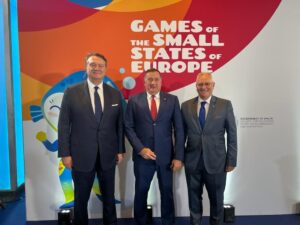Games of the Small States of Europe: A Celebration of Unity and Athleticism
The Games of the Small States of Europe (GSSE) is a unique sporting event that brings together some of Europe’s smallest countries to compete in a range of disciplines. Established to foster unity, friendly competition, and athletic excellence among small nations, the GSSE has grown into a significant event on the European sports calendar.
Origins and Creation of the Games
The idea for the Games of the Small States of Europe was conceived in 1981 by the president of the Icelandic Olympic Committee, Árni B. Sigurðsson, during a meeting of the European National Olympic Committees. His vision was to create an event that would give smaller countries a platform to showcase their athletes, who often struggled to compete against larger nations with more resources.
The first Games were held in 1985 in San Marino, marking the beginning of what would become a biennial event celebrating sportsmanship and camaraderie. The Games were created with the following goals:
- To provide athletes from small states with opportunities to compete internationally.
- To foster friendship and understanding among participating countries.
- To promote the Olympic spirit and values in smaller nations.
Participating Countries and Criteria
The Games are specifically designed for European countries with populations of less than one million. Since its inception, nine countries have consistently participated in the GSSE:
- Andorra
- Cyprus
- Iceland
- Liechtenstein
- Luxembourg
- Malta
- Monaco
- Montenegro
- San Marino
These nations, often overlooked in larger competitions like the Olympics, find the GSSE an ideal platform to shine and develop their sports programs.
Evolution and Growth
Since the first edition in 1985, the Games of the Small States of Europe have evolved significantly. Initially featuring only a handful of sports, the event has expanded to include a wide range of disciplines, such as:
- Athletics
- Swimming
- Basketball
- Judo
- Tennis
- Volleyball
- Sailing
The diversity of sports allows countries to compete across a spectrum of events, fostering a more inclusive and varied competitive environment. This growth has helped the GSSE gain recognition and respect within the international sports community.
Why the Games Matter
The importance of the GSSE goes beyond the medals and records. The event plays a crucial role in promoting sports and healthy lifestyles within small nations and provides an opportunity for athletes to experience international competition. Key impacts of the Games include:
- Encouraging Sports Development: Smaller countries often lack the resources to compete at the highest levels. The GSSE provides an opportunity for these nations to develop their sports programs and encourage youth participation.
- Strengthening International Ties: The Games promote peace and unity by fostering relationships between neighboring countries. This exchange of culture and sportsmanship builds bridges and strengthens diplomatic ties.
- Highlighting Lesser-Known Sports: The GSSE is also known for featuring sports that may not always be in the spotlight, helping to increase their popularity and participation.
Challenges and Adaptations
Like any international event, the GSSE faces challenges, such as maintaining competitiveness and ensuring participation from all eligible nations. The Games have adapted over time to include more sports and provide equal opportunities for men and women, reflecting broader changes in global sports.
To Be Continued!
As the GSSE continues to grow, it remains committed to its founding principles: promoting athleticism, unity, and cultural exchange among Europe’s smaller nations. The Games of the Small States of Europe have proven that even the smallest countries can achieve great things through determination, cooperation, and a shared love of sport.
With each edition, the GSSE strengthens its legacy as a celebration of what is possible when nations come together on the playing field, not just as competitors but as partners in promoting peace, health, and solidarity. The Games will continue to inspire future generations, proving that size is no limit to greatness.
